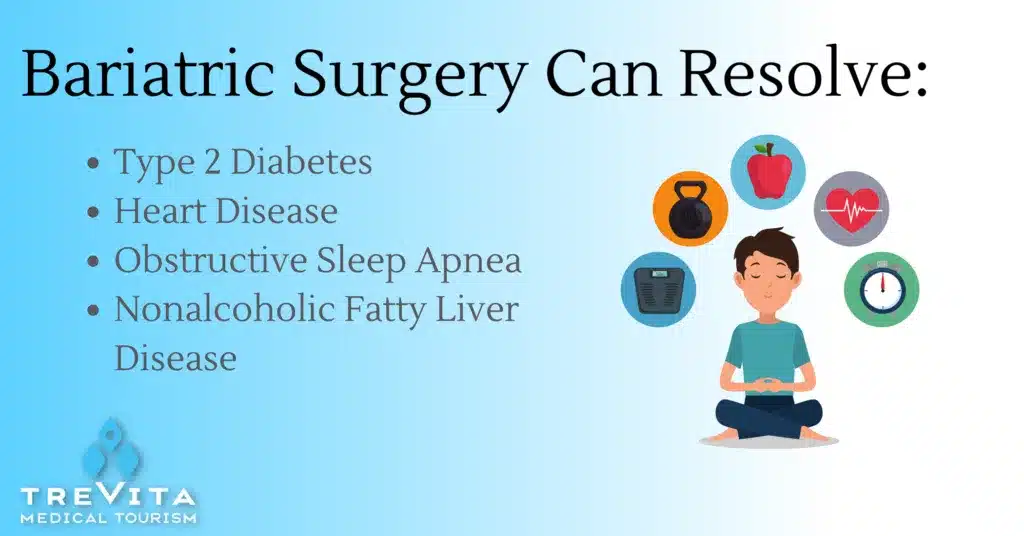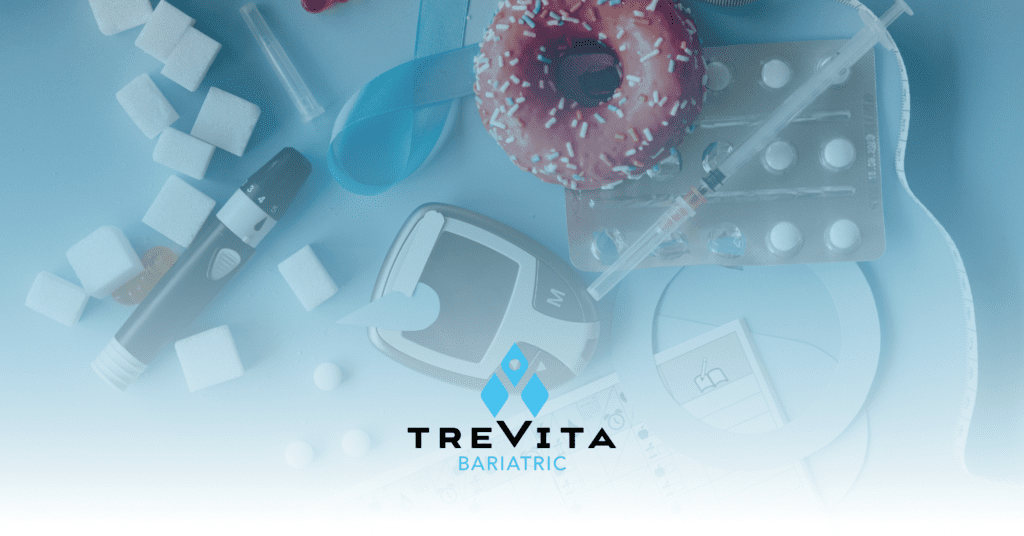In the world of medical marvels, bariatric surgery stands tall as a hero in the battle against diseases like diabetes, heart disease, high blood pressure, and others. According to the National Institute of Health, this surgical procedure doesn’t just provide hope; it can greatly reduce your medication intake by reversing or even curing diseases related to obesity. How does it work its magic? Let’s dive into the details!

Heart Disease
Bariatric surgery isn’t just about shedding pounds; it is a true ally in the fight against heart disease, and here are some of the benefits for heart health:
- Improved Metabolic Profile: Beyond just weight loss, bariatric surgery works its magic on your metabolism. It has the power to improve blood sugar levels, enhance insulin sensitivity, and revamp your lipid profile. This superhero surgery can tackle risk factors like diabetes and high cholesterol, putting your heart at ease.
- Blood Pressure, Be Gone: In the world of obesity, high blood pressure is a notorious villain. Bariatric surgery, however, serves as a mighty potion that can dramatically lower your blood pressure. This not only eases the burden on your heart but also diminishes the threat of heart disease.
- Battling the Plaque Invaders: Atherosclerosis, the enemy that lurks within your arteries, is thwarted by bariatric surgery. By addressing high blood pressure, diabetes, and high cholesterol, this surgery acts like a guardian of your heart’s sanctity, slowing down or even reversing plaque buildup.
- A Shield Against Heart Failure: Heart failure often lurks in the shadows of obesity. Bariatric surgery, however, shines a radiant light of hope. It drastically reduces the risk of heart failure by tackling obesity and its troublesome companions.
Type 2 Diabetes
Excess weight, a notorious accomplice in the development of type 2 diabetes, is vanquished following bariatric surgery, and blood sugar levels are brought under control. Here is how weight loss surgery can be a great ally for people who have developed diabetes, or are at high risk of doing so:
- Insulin Sensitivity: Bariatric surgery isn’t just about weight loss; it’s about making the body’s cells listen to insulin commands. Rapid improvements in insulin sensitivity occur, allowing glucose to enter cells with ease. The result? Blood sugar levels normalize or become much easier to manage.
- Lightning-Fast Glycemic Control: Type 2 diabetes doesn’t stand a chance when bariatric surgery enters the scene. Many patients witness rapid improvements in glycemic control, often seeing their blood sugar levels return to normal within days or weeks post-surgery – sometimes even before the scale registers significant weight loss.
- Medication Reduction: Imagine bidding farewell to diabetes medications – a dream come true for many! Bariatric surgery frequently allows patients to reduce or eliminate their reliance on insulin and oral medications, leading to a significantly improved quality of life and reduced financial burden.
- Shielding Against Complications: Bariatric surgery not only manages blood sugar levels but also shields against the dreaded complications of diabetes. The risk of cardiovascular disease, kidney disease, neuropathy, and other diabetes-related issues is significantly reduced.
Obstructive Sleep Apnea (OSA)
Many individuals who undergo bariatric surgery experience a remarkable transformation in their OSA. Some find that their symptoms vanish entirely, while others witness significant improvements.
- Improved Respiratory Function: With obesity reduced, the diaphragm and chest wall can function more effectively. This means better control over breathing during sleep and fewer disruptions in airflow that characterize OSA.
- Reduced Fat Around the Neck: Obesity often leads to the accumulation of fat deposits in and around the neck area. This can narrow the airway and contribute to the collapse of soft tissues during sleep, a hallmark of OSA. Bariatric surgery’s weight loss effect leads to a reduction in this perilous fat, helping to keep the airway open during sleep.
- Lower Risk of OSA-Related Complications: OSA is not just a nightly nuisance; it’s a risk factor for serious health issues such as hypertension, heart disease, and diabetes. By addressing OSA through bariatric surgery, the risk of these complications can be substantially reduced.
- Reduced Dependence on CPAP: Continuous positive airway pressure (CPAP) machines are commonly used to manage OSA. Post-bariatric surgery, some individuals may find that they require lower CPAP pressure settings or can even discontinue CPAP use altogether, enhancing comfort and convenience.
Nonalcoholic Fatty Liver Disease (NAFLD) or Nonalcoholic Steatohepatitis (NASH)
When it comes to liver health, these are two troublesome conditions that have posed significant challenges. Here is how bariatric surgery can greatly help and prevent diseases for your liver:
- Taming the Inflammation: Inflammation in the liver is a key feature of NASH. Bariatric surgery, intriguingly, has a proven ability to tamp down systemic inflammation. This ripple effect extends to the liver, where it pacifies inflammation and averts further damage.
- Lower Risk, Elevated Wellness: The brave choice of addressing NAFLD and NASH through bariatric surgery substantially slashes the risk of liver-related complications like cirrhosis and liver failure. It’s akin to building a fortress against these looming threats.
However, it’s essential to remember that bariatric surgery isn’t a one-size-fits-all solution to cure or reverse these diseases. Consultation with a healthcare provider is your compass, guiding you toward the most suitable path. And after the surgery, embrace a vibrant life with a balanced diet, regular physical activity, and ongoing medical check-ups—your passport to a flourishing health.

